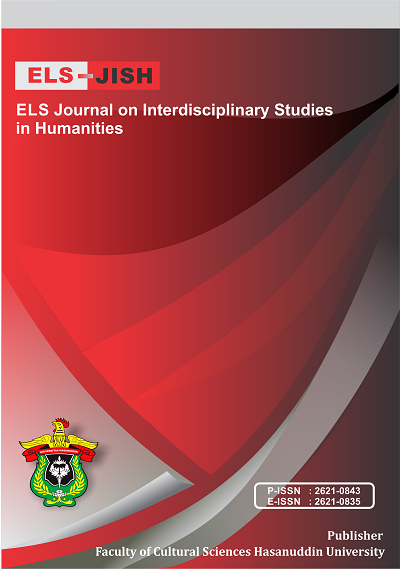A Genre Analysis of the Undergraduate Thesis Abstracts: Revisiting Swales’ Theory of Written Discourse
DOI:
https://doi.org/10.34050/elsjish.v4i1.11598Keywords:
confirmation, analysis, genre, rhetorical movesAbstract
The genre analysis has become a critical study in pragmatic which forms the dialogic interaction that manifest written academic discourse socially and culturally. The aims of this study is to describe the pattern and variation of moves that appear from the undergraduate thesis abstracts at a specific college in the Bone Region. The implications of this study on educational written materials are included. Data collection comprised 45 abstracts as samples consist of 3 cohorts (2015, 2016 and 2017) of university students, each with 15 abstracts. A structure studied by Hyland (2005) was used to explain the different trends in the abstracts. Unstructured interviews with and evaluation of the students were carried out to better understand the writing skills of the students. Then data were analyzed using content analysis. The results show that most abstracts involve rhetorical gestures similar to the previous study. The moves include an initial statement, a clarification of intent and confirmation of the results and explanations for the research 's significance. The results also indicated that university students are more mindful of the logical series. Rhetorical movements and language properties needed in abstract academic learning. The aim, methodology and findings of the related paper are the most abstracts. These findings are compatible with previous studies and show that future scientists based on movement analysis that should explore the link between movement analysis results and academic teaching content. The results justify such pedagogic consequences that indicate that the student has an interest in current education research to change the teaching materials.
References
Ballenger, B. (2010). The curious writer. USA: Longman.
Elbow, P. (1995). Being a writer vs. being an academic: A conflict in goals. College Composition and Communication, 46(1), 72-83.
Mansyur, F. A., & Suherman, L. A. (2020). The Function of Proverbs as Educational Media: Anthropological Linguistics on Wolio Proverbs. ELS Journal on Interdisciplinary Studies in Humanities, 3(2), 271-286.
Prihandoko, L. A., Tembang, Y., Marpaung, D. N., & Rahman, F. (2019, October). English language competence for tourism sector in supporting socio-economic development in Merauke: A Survey Study. In IOP Conference Series: Earth and Environmental Science (Vol. 343, No. 1, p. 012170). IOP Publishing.
Rahman, F. (2016). The Strategy of Teaching Literature through Language-based Methods: A Communicative Approach. In Annual Seminar on English Language Studies 2016 (Vol. 1, pp. 156-170).
Rahman, F. (2017). Cyber literature: A reader–writer interactivity. International Journal of Social Sciences & Educational Studies, 3(4), 156.
Rahman, F., & Weda, S. (2018). Students’ perceptions in appreciating English literary works through critical comment: A case study at Hasanuddin University and Universitas Negeri Makassar. Asian EFL Journal, 20(3), 149-172.
Samraj, B. (2014). Disciplinary variation in abstracts: The case of wildlife behaviour and conservation biology. In Academic discourse (pp. 50-66). Routledge.
Vergaro, C. (2004). Discourse strategies of Italian and English sales promotion letters. English for Specific Purposes, 23(2), 181-207.
Weissberg, B. (1993). The graduate seminar: Another research-process genre. English for Specific Purposes, 12(1), 23-35.
Downloads
Published
Issue
Section
License
Copyright (c) 2021 Andi Suwarni

This work is licensed under a Creative Commons Attribution-NonCommercial-ShareAlike 4.0 International License.






